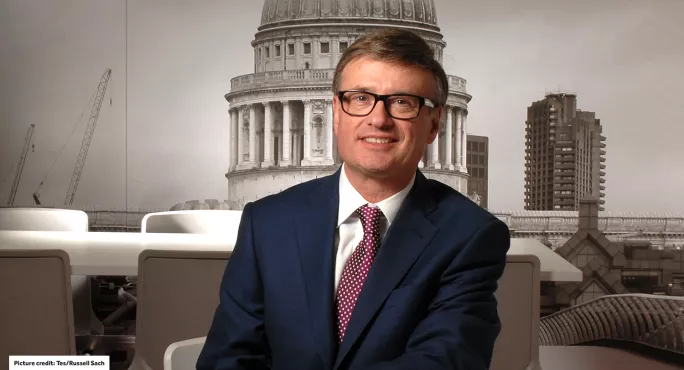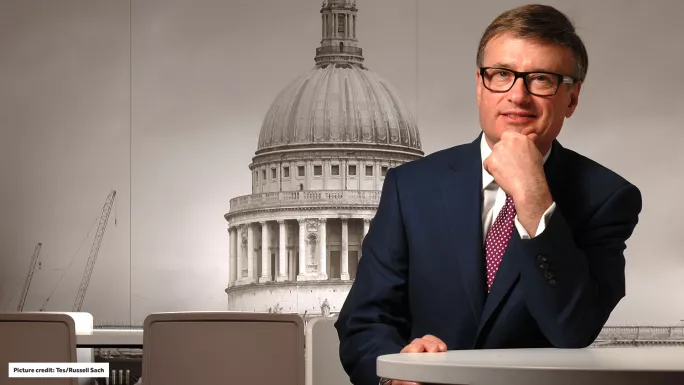- Home
- Sir Daniel Moynihan interview: England’s highest-paid academy boss on expansion, Ofsted and overcoming disadvantage
Sir Daniel Moynihan interview: England’s highest-paid academy boss on expansion, Ofsted and overcoming disadvantage

This profile was first published in Tes magazine on April 1, 2016.
He is one of the most powerful people in education - and one of the highest paid - but Sir Daniel Moynihan is something of an enigma.
Chief executive of one the largest and most successful academy chains, he has the ear of ministers but rarely gives interviews. Now, Sir Daniel has agreed to his first sit-down interview with Tes. While he is not exactly coming out of the shadows, this does seem to herald some kind of shift in approach.
We meet in Harris Westminster Sixth Form, perhaps the most controversial of the Harris Federation’s 37 schools. The selective sixth form, which opened in September 2014, was called the most elitist school in the country and branded a £45 million vanity project.
It is also a short stroll from Parliament and surrounded by government departments. Harris is based in Croydon, but as Sir Daniel had meetings at the Department for Education - naturally enough - Westminster was a more convenient place to meet.
Businesslike but welcoming, he appears relaxed, only twice referring to the three typed pages of notes in front of him.
A natural assumption is that this interview may be part of a campaign to succeed Sir Michael Wilshaw as head of Ofsted. In many ways, Sir Daniel is an ideal candidate. All the Harris academies inspected so far have been rated good or outstanding, so it’s no wonder he has been widely tipped as a frontrunner.
But he is quick to rule himself out of the running. Does he want the Ofsted job? “No,” he says. “It is an honour that people mention my name, but nobody who has mentioned it has ever asked me.
“I will never say never, but we have got significant change coming through at GCSE and A level and there is retrenchment in budgets - I don’t feel now would be a great time for me to move on from Harris. Who knows in the future, but this time around it is not for me.”
That seems unequivocal enough, although it’s clear that he is someone who likes to leave his options open.
Every child can achieve
For now, his focus is on Harris and its ever-growing family of schools. In the past, the federation has been criticised for an aggressive approach to expansion, taking over schools despite the objections of headteachers and parents, but there is no sign of it slowing down.
“We’re happy to keep gradually expanding,” he says. “As long as we’re doing well and we can make a difference, we’re happy to do that. If whoever is running the school isn’t able to improve it quickly enough, somebody else should be able to do so.”
This drive to raise standards and do it quickly is what fuels his own approach. He describes his philosophy as one where “every child can achieve, if they’re given the right support and the right education”, while recognising the danger of appearing glib.
“Although that sounds obvious, it is the case that, in our country, that has not been true if you are poor, or from certain ethnic groups or have been looked after, so it is not an obvious statement,” he adds.

It’s an approach derived at least in part from his own education, at what he describes as a “very difficult” comprehensive - St George’s Catholic School in Maida Vale. It was the same inner-London secondary where, years later, headteacher Philip Lawrence was stabbed to death at the school gate.
In Sir Daniel’s time at the school, half the pupils were children of Irish immigrants, while the other half were Afro-Caribbean. Standards were low and the assumption was that they were destined for labouring jobs.
But he was determined to confound expectations, and a job stacking shelves gave him the means. “I knew that I was getting poor teaching and I wanted those O levels, so I marched into Foyles bookshop with my pocket money and bought all the revision guides and sat at home and learned what was in them, because nobody was teaching it to me,” he recalls.
Sir Daniel got his O levels, studied economics at UCL and, after a year at professional services multinational PricewaterhouseCoopers, he took his PGCE and went on to teach economics, as well as authoring several textbooks.
His experience has given him a personal stake in tackling underachievement, as well as what he describes as Harris’ speciality of turning round struggling schools.
Striving to overcome
“The purpose of education, for me, is to overcome disadvantage, as well as for youngsters to develop a love of knowledge and a love of learning,” he says. “Primarily, it is about overcoming disadvantage - that is exactly what Harris is about. It is recognising that life isn’t fair but education can make it fair.”
Among the secrets of Harris’ success he cites investment in professional development, an urgency for improvement, collaboration and analysing data, as well as its well-known focus on discipline and uniform.
“We want everybody to focus on learning. Everyone has the same uniform and standards are clear, and therefore we have no argument about that,” he says. Similar uniform does not mean uniformity, though. Sir Daniel insists that heads of individual schools have considerable freedom and there is even room for the odd maverick. “Our branding is very similar and that gives people the impression that our schools are similar, but actually they’re very different,” he says.
His recent higher profile may also be in response to recent criticisms. Harris may be one of the most successful chains, but it is also one of the most controversial.

As well as accusations of predatory practices, the past few months have included claims that pupils “disappeared” from Harris school rolls in the run-up to GCSEs and that the chain has an abnormally high teacher turnover.
For the first, Sir Daniel says that his schools have followed the appropriate regulations and that most pupils are moving between schools in areas known for transience. “There is definitely not a policy [of moving out low-performing pupils],” he insists.
And while Harris’ teacher turnover may be high compared with the rest of the country, he says that it is not particularly high for London. He also complains that teachers are counted as leaving when they are moving between the Federation’s schools, a common practice.
Ofsted: an unhealthy regime?
But back to Ofsted, and while he may not be in the running this time, he has strong views about school inspection.
While the inspection regime has contributed “an enormous amount” to school improvement - and he is a particular fan of short inspections and the shift from “satisfactory” to “requires improvement” - he argued that it should become less prescriptive.
“We, as a profession, have been driven by what Ofsted want and we need to be more confident about what we do, because that is not healthy. But the fact is that if you get a bad Ofsted, that does have consequences,” he says.
“The next stage would be to move away from that culture to see Ofsted as a more enabling thing,” he adds.
It sounds as though he would make a strong candidate for chief inspector - one day.
CV: Sir Daniel Moynihan
1984: PGCE, Institute of Education
1984: Teacher of economics and business studies, Bishop Challoner School, Tower Hamlets
1985: Head of economics, Bishop Challoner School
1988: Head of business and economics, Kingsbury High School, Brent
1990: Assistant principal, The Leigh City Technology College, Dartford
1995: Vice principal, The Leigh City Technology College
1999: Headteacher, Valentines High School, Ilford
2005: Principal, Harris City Technology College, Croydon (now Harris City Academy Crystal Palace)
2006: CEO of the Harris Federation
Want to keep up with the latest education news and opinion? Follow Tes on Twitter and like Tes on Facebook
Keep reading for just £1 per month
You've reached your limit of free articles this month. Subscribe for £1 per month for three months and get:
- Unlimited access to all Tes magazine content
- Exclusive subscriber-only stories
- Award-winning email newsletters



